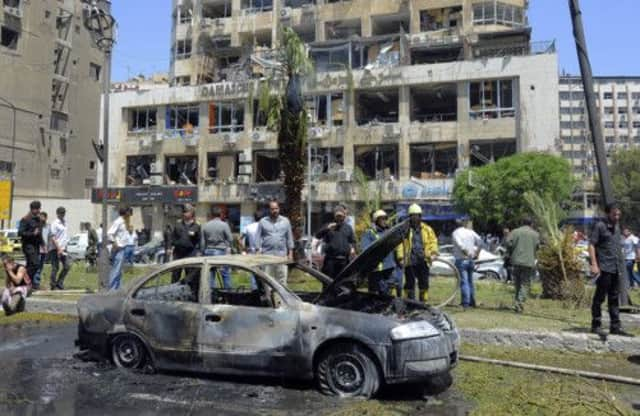Syria: Bomb kills 13 in Damascus


The blast came as rebels and forces loyal to president Bashar al-Assad blamed each other for an alleged chemical weapons attack the day before.
Residents in Damascus described scenes of carnage in Marjeh Square, the commercial district of the capital, with dozens of cars and buildings damaged by the bomb, which exploded in front of the former interior ministry building.
Advertisement
Hide AdAdvertisement
Hide Ad“Glass was shattered around the whole block and shopkeepers were using brooms to clean up the glass in front of their shops,” said one resident.
State-run Syria Television said 70 people were also wounded, several critically, in what it said was an attack by “terrorists” fighting in a bid to overthrow Mr Assad.
Three mortar bombs landed in the regime-held district of Baramkeh a few hours after the bomb, opposition activists said.
The UK-based Syrian Observatory said that nine civilians and five security personnel had been killed, but added that the toll was likely to rise.
The blast came a day after prime minister Wael al-Halki survived an attack on his convoy in Damascus. Opposition activists described similar scenes of bloodshed in the central city of Hama where they said 13 civilians were killed in a bombardment by government forces.
Fighting in Syria, now entering its third year, has intensified in recent weeks with Mr Assad’s forces attempting to roll back rebel advances. An estimated 70,000 people have now been killed in the civil war.
Each side blamed the other for what they both said was a chemical attack in the northern city of Saraqeb on Monday.
America has long said it views the use of chemical weapons in Syria as a “red line” but, wary of the false intelligence that was used to justify the 2003 war in Iraq, Washington has said it wants proof before taking action.
Advertisement
Hide AdAdvertisement
Hide AdPresident Barack Obama yesterday said the US does not know how or when chemical weapons were used in Syria or who used them. Mr Obama said he had to make sure he had the facts before deciding how to respond to evidence that chemical weapons had been used.
He repeated his statement that the use of chemical weapons would be a “game changer” in the region. But he said the international community had to be completely confident in the assessment.
Iran, Mr Assad’s main backer and self-declared enemy of the US, echoed that line on Tuesday and said it also saw any use of chemical weapons as a “red line”. Iranian foreign minister Ali Akbar Salehi did not indicate what action Tehran might take if chemical weapons use were proven, but blamed the rebels in any case.
Opposition video showed small canisters, which rebels said held a poisonous gas, and footage of a clinic with people lying on cots wearing oxygen masks or vomiting into waste bins.
State TV claimed rebels had mixed a weapon with a chemical powder and used them in attacks they then pinned on regime forces.
A United Nations’ team trying to examine alleged sites of chemical attacks has been stalled, making it impossible to verify what, if any, chemical is being used.
Single airstrike turns battle for helicopter base in the north
Syrian troops battled opposition fighters near a military helicopter base in the northern province of Aleppo yesterday, killing 15 rebels in a single airstrike, according to Observatory director Rami Abdul-Rahman.
Advertisement
Hide AdAdvertisement
Hide AdThe rebels tried to storm the Mannagh base late on Monday but the regime sent out fighter jets to pound rebel positions around the base, which is near Syria’s border with Turkey, Mr Abdul-Rahman said.
In the north-western province of Idlib, a regime airstrike near the Bab al-Hawa border crossing with Turkey killed a child and wounded several more people, the Observatory said.
A witness near Reyhanli, on the Turkish side of the frontier, described a huge plume of black smoke and reported seeing wounded people being taken by ambulance from the Syrian side to the Turkish checkpoint.
Thousands of Syrian refugees live in the makeshift Bab al-Hawa camp.
Syria’s state news said 14 people were killed and 103 wounded in the attack.
The conflict in Syria began with largely peaceful protests in March 2011, but has since morphed into a civil war that has killed more than 70,000 people, according to the United Nations. Air power has proven to be Mr Assad’s greatest advantage in the civil war, and he has used it to check rebel advances and prevent the opposition setting up a rival government in the north.